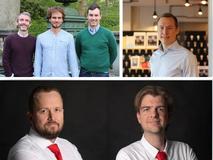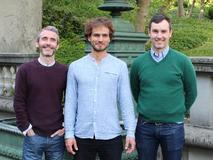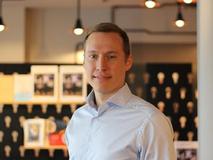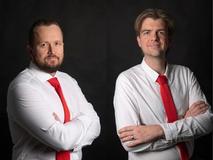CHF 40,000 to turn waste into value, for sustainable cellulose white pigments, and to accelerate the transition of the industry to fully electric for a greener tomorrow
27.12.2022
Gaia Technologies, Impossible Materials, SolidWatts win Venture Kick's second stage of financial and entrepreneurial support. Their projects produce clean label ingredients for cosmetics, food, and feed manufacturers out of agricultural sidestreams, provide a patented biomaterial platform revolutionizing the way drugs can be administered to patients, and aim at disrupting the market with high-power, industrial-grade radio frequency (RF) and microwave (MW) heating based on Solid-State Amplifier (SSA) technology for chemical, food processing, construction materials, recycling, and many other industries.
 |
 Gaia Technologies: from left to right Dr. Enrico Tenaglia, Mr. Claudio Reinhard, and Mr. Samuel Buhlmann
|
 Impossible Materials: Lukas Schertel
|
 SolidWatts co-founders: CEO Dr. Markus Aicheler and CTO Dr. Jan Kovermann
|
Gaia Technologies: Turning waste into value
The cosmetic, food, and pet food industries eagerly look for new cost-effective natural ingredients coming from sustainable supply chains and equaling or surpassing the performance of current standards. This is a response to growing consumer demand for healthy ingredients and increasing regulatory pressure against synthetic compounds. This need of manufacturing companies can be matched by the development of cost-effective upcycling methods to recover bio-compounds (and additional marketable resources) from agricultural sidestreams and transform them into clean-label ingredients.
Gaia Technologies has invented an innovative method to upcycle agricultural sidestreams into bio-compounds and added-value ingredients. The core team is composed of Mr. Claudio Reinhard, Dr. Enrico Tenaglia, and Mr. Samuel Buhlmann. Claudio is a mechanical engineer and leader of the EIT Food project Phenoliva which laid the foundations of Gaia Technologies. Claudio Reinhard started the sidestreams research at ETH Zurich where he currently leads the project Phenoliva. Gaia Tech is currently in the process of obtaining the ETH spin-off label. Through its novel approach, Gaia tackles the ever-increasing trend to substitute synthetic compounds with natural alternatives in the cosmetics, food, and feed sector. At the same time, Gaia responds to the pressing needs of the primary sector to create new value streams and reduce its environmental footprint. Gaia Tech builds on the results from the EIT Food project Phenoliva and aims to commercialize a portfolio of value-added products derived from olive pomace (e.g. antioxidants, biochar, activated carbon, biogas) obtained through a technology that, differently from competitors' solutions, is cost-effective and highly scalable. The market of natural antioxidants is predicted to grow at a CAGR of 6.6% to over 1 billion by 2027.
The Venture Kick funds will be used to get access to lab and pilot infrastructure, optimize and upscale our extraction process, obtain important product certifications, and increase Gaia Tech's visibility. gaiatech.ch
Impossible Materials: sustainable cellulose white pigments
Regulators are banning the use of titanium dioxide, ruling it unsafe as a food additive (“E171”) and threatening other health-sensitive segments. Additionally, businesses look at natural ingredients as strategic opportunities driven by an end-user request for plant-based products and climate change policies to reduce CO2 emissions. Users of TiO2 are forced to seek safe and sustainable alternatives whilst current substitutes lack performance.
Impossible Materials provides businesses with plant-based formulation ingredients to enable them more sustainable product formulations and work towards a circular economy. Their first product is a cellulose white pigment to replace the market
leader, titanium dioxide. They will initially sell to health-sensitive sectors, such as food, pharma, and cosmetics. In food, cellulose white pigments will serve as an enabler for plant-based meat/fish and dairy products. Further market extension potential lies in paint, coatings, and inks. Their process has the potential to save millions of tons of CO2 emissions at scale. Their proprietary technology has been developed by leading cellulose experts Prof. Silvia Vignolini together with Dr. Lukas Schertel who teamed up with Oliver Polcher, a serial entrepreneur, to complement the skillset with proven start-up expertise.
They would like to use the funds of venture Kick Stage 2 to work with existing customers on collaboration details, including material testing, facility visits, and agreement outlining. The funds further support the active fundraising, hiring and facility infrastructure management of Impossible Materials for their Seed funding round. www.impossiblematerials.com
The cosmetic, food, and pet food industries eagerly look for new cost-effective natural ingredients coming from sustainable supply chains and equaling or surpassing the performance of current standards. This is a response to growing consumer demand for healthy ingredients and increasing regulatory pressure against synthetic compounds. This need of manufacturing companies can be matched by the development of cost-effective upcycling methods to recover bio-compounds (and additional marketable resources) from agricultural sidestreams and transform them into clean-label ingredients.
Gaia Technologies has invented an innovative method to upcycle agricultural sidestreams into bio-compounds and added-value ingredients. The core team is composed of Mr. Claudio Reinhard, Dr. Enrico Tenaglia, and Mr. Samuel Buhlmann. Claudio is a mechanical engineer and leader of the EIT Food project Phenoliva which laid the foundations of Gaia Technologies. Claudio Reinhard started the sidestreams research at ETH Zurich where he currently leads the project Phenoliva. Gaia Tech is currently in the process of obtaining the ETH spin-off label. Through its novel approach, Gaia tackles the ever-increasing trend to substitute synthetic compounds with natural alternatives in the cosmetics, food, and feed sector. At the same time, Gaia responds to the pressing needs of the primary sector to create new value streams and reduce its environmental footprint. Gaia Tech builds on the results from the EIT Food project Phenoliva and aims to commercialize a portfolio of value-added products derived from olive pomace (e.g. antioxidants, biochar, activated carbon, biogas) obtained through a technology that, differently from competitors' solutions, is cost-effective and highly scalable. The market of natural antioxidants is predicted to grow at a CAGR of 6.6% to over 1 billion by 2027.
The Venture Kick funds will be used to get access to lab and pilot infrastructure, optimize and upscale our extraction process, obtain important product certifications, and increase Gaia Tech's visibility. gaiatech.ch
Impossible Materials: sustainable cellulose white pigments
Regulators are banning the use of titanium dioxide, ruling it unsafe as a food additive (“E171”) and threatening other health-sensitive segments. Additionally, businesses look at natural ingredients as strategic opportunities driven by an end-user request for plant-based products and climate change policies to reduce CO2 emissions. Users of TiO2 are forced to seek safe and sustainable alternatives whilst current substitutes lack performance.
Impossible Materials provides businesses with plant-based formulation ingredients to enable them more sustainable product formulations and work towards a circular economy. Their first product is a cellulose white pigment to replace the market
leader, titanium dioxide. They will initially sell to health-sensitive sectors, such as food, pharma, and cosmetics. In food, cellulose white pigments will serve as an enabler for plant-based meat/fish and dairy products. Further market extension potential lies in paint, coatings, and inks. Their process has the potential to save millions of tons of CO2 emissions at scale. Their proprietary technology has been developed by leading cellulose experts Prof. Silvia Vignolini together with Dr. Lukas Schertel who teamed up with Oliver Polcher, a serial entrepreneur, to complement the skillset with proven start-up expertise.
They would like to use the funds of venture Kick Stage 2 to work with existing customers on collaboration details, including material testing, facility visits, and agreement outlining. The funds further support the active fundraising, hiring and facility infrastructure management of Impossible Materials for their Seed funding round. www.impossiblematerials.com
Solidwatts: accelerate the transition of the industry to fully electric for a greener tomorrow
Climate change and political tensions require industry to rapidly shift the powering of heat-based processes away from fossil fuel to - ideally green - electricity. Just like in your home kitchen, electric heat can be delivered in different ways. Of these, the microwave oven is the most efficient, consistently heating the entire volume of a good with substantially lower energy loss. Even though this method exists on a light industrial scale, the power levels needed for heavy industrial applications have yet to be realized.
SolidWatts aims at disrupting the market with high-power, industrial-grade radio frequency (RF) and microwave (MW) heating based on Solid-State Amplifier (SSA) technology for chemical, food processing, construction materials, recycling, and many other industries. SolidWatts is co-founded by CEO Dr. Markus Aicheler and CTO Dr. Jan Kovermann. Both co-founders formerly worked at CERN and use their network for R&D collaborations and projects. As a CERN spin-off, SolidWatts will help integrators, process developers, and process industries to transition their industrial heating processes from fossil fuels to RF and MW. Their smart, solid-state, power amplifiers will be designed for maximum scalability and cost-efficient production with equipment cost reductions of one order of magnitude below current levels. 2019 EU gas consumption for industrial heating was 3170 Petajoules (PJ), equating to >100 electric Gigawatt (GW) scale power stations running 24/7. SolidWatts estimates that 15% of the industry can benefit from modern enabling RF & MW heating, equating to a market opportunity of 10-15 GW. At an estimated cost of 3CHF/W, the client investment in their technology will be in the order of tens of billion CHF in the EU alone, distributed over the next two decades. The global market is ten times larger. Using carbon-neutral electricity to feed RF and MW power amplifiers will save >100 Megatonnes of CO2 per year.
The Venture Kick funds will be used for the completion of the first 10 kW prototype as the first sellable product and is already scheduled to be tested at the first client's premises. Additionally, they will invest in additional customer acquisition and consolidation as well as in prototyping equipment. solidwatts.ch


